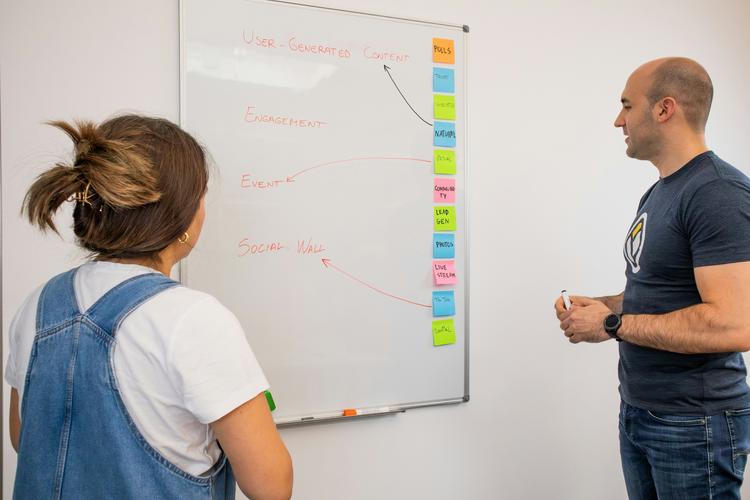Blog
“Resilience Is a Skill—Not a Trait: How Coaching Helps You Build It”
Introduction:
When people hear the word “resilience,” they often imagine someone who’s naturally tough, emotionally invincible, or untouched by stress. But the truth is, resilience isn’t something you’re born with—it’s something you build. And just like a muscle, it grows through intentional effort, the right tools, and guided support.
That’s where resilience coaching comes in.
What Is Resilience Coaching?
Resilience coaching focuses on helping individuals develop the capacity to navigate adve…
How Entrepreneurial Mindset Coaching Helps You Overcome Self-Doubt and Take Action
Introduction
Self-doubt is a silent business killer. It stops talented coaches from launching, pricing, promoting, or even showing up. Entrepreneurial mindset coaching is the antidote.
Why Self-Doubt Is So Common in Coaching
Even the best coaches struggle with questions like:
- “Who am I to do this?”
- “Will people actually pay me?”
- “What if I fail publicly?”
Unlike traditional therapy or academic paths, entrepreneurship doesn’t offer guaranteed outcomes or validation. That’s why mindset wo…
5 Entrepreneurial Mindset Shifts That Will Transform Your Coaching Business
Introduction
The most successful coaches don’t just master their craft—they master their mindset. Whether you're just starting or scaling, these five entrepreneurial mindset shifts can help you unlock new levels of clarity, confidence, and growth.
1. From Fear of Selling → to Confidence in Serving
Selling isn’t sleazy when it’s about solving real problems. Entrepreneurial coaches don’t sell “sessions”—they offer transformation.
Reframe: You’re not asking for money. You’re offering a result tha…
What Is Entrepreneurial Mindset Coaching — And Why Every Coach Needs It
Introduction
Many coaches and therapists enter the field driven by passion and purpose. But passion alone doesn’t build a sustainable business. That’s where entrepreneurial mindset coaching comes in. It’s the missing link between great service and long-term success.
What Is Entrepreneurial Mindset Coaching?
At its core, entrepreneurial mindset coaching helps professionals think, act, and grow like entrepreneurs. It goes beyond skills and tools—it transforms how you approach challenges, opportunit…
Becoming a Post-Traumatic Growth Coach: What You Need to Know
Are you a coach, therapist, or helping professional who wants to make a deeper impact in the lives of those healing from trauma?
Post-Traumatic Growth (PTG) Coaching might be your next step.
This powerful, evidence-informed approach supports clients not only in recovering from trauma, but in transforming through it.
What Is PTG Coaching?
PTG Coaching is based on the psychological framework developed by Dr. Tedeschi and Dr. Calhoun, which explores the potential for personal growth after traum…
5 Signs You’re Ready for Post-Traumatic Growth Coaching
Some wounds take time to close — but what happens after the pain softens? What happens when you’re no longer fighting to survive, but not yet sure how to thrive?
That’s often the moment people discover Post-Traumatic Growth Coaching.
If you've walked through trauma and are now wondering, "What's next?" — this might be your path.
1. You Feel Like Something’s Missing — Even After Therapy
You’ve done the work. Maybe you've seen a therapist, gone to support groups, or found ways to cope. But now…
What Is Post-Traumatic Growth Coaching (And How Does It Work)?
Trauma changes us — but so can healing.
When we think about trauma, we often focus on what was lost: safety, trust, confidence, identity. But what if trauma could also be the starting point for growth, meaning, and even purpose?
That’s where Post-Traumatic Growth Coaching comes in.
What Is Post-Traumatic Growth?
Post-Traumatic Growth (PTG) refers to the positive psychological transformation that can occur after experiencing adversity. First defined by psychologists Dr. Richard Tedeschi and D…
Emotional Agility Coaching: Transforming Challenges into Opportunities
Introduction
What if the emotions that once held your clients back could become their greatest source of strength? That’s the promise of emotional agility coaching — transforming emotional challenges into opportunities for growth.
Understanding Emotional Challenges
Emotions like fear, frustration, or sadness often trigger avoidance or self-doubt. Traditional coaching might focus on fixing these emotions or pushing past them. Emotional agility coaching, however, invites clients to lean into emotio…
5 Practical Exercises to Build Emotional Agility in Coaching Sessions
Introduction
Emotional agility is a skill — and like any skill, it improves with practice. Coaches can help clients build emotional agility through simple yet effective exercises. Here are five you can easily integrate into your coaching sessions.
- Label the Emotion
Encourage clients to name their current emotion specifically (“I’m feeling anxious” vs. “I’m upset”). Naming emotions reduces their intensity and helps clients observe feelings without judgment. - The Mindful Pause
Teach clients to p…
What Is Emotional Agility and Why Coaches Need It
Introduction
In today’s fast-paced, uncertain world, emotional agility has become a must-have skill — both for coaches and their clients. But what exactly is emotional agility, and why is it so critical for effective coaching?
What Is Emotional Agility?
Emotional agility is the ability to navigate your emotions with flexibility, awareness, and openness. It means recognizing feelings without getting stuck in them, accepting what you feel without judgment, and choosing intentional actions that alig…
Blog
“Resilience Is a Skill—Not a Trait: How Coaching Helps You Build It”
Introduction:
When people hear the word “resilience,” they often imagine someone who’s naturally tough, emotionally invincible, or untouched by stress. But the truth is, resilience isn’t something you’re born with—it’s something you build. And just like a muscle, it grows through intentional effort, the right tools, and guided support.
That’s where resilience coaching comes in.
What Is Resilience Coaching?
Resilience coaching focuses on helping individuals develop the capacity to navigate adve…
How Entrepreneurial Mindset Coaching Helps You Overcome Self-Doubt and Take Action
Introduction
Self-doubt is a silent business killer. It stops talented coaches from launching, pricing, promoting, or even showing up. Entrepreneurial mindset coaching is the antidote.
Why Self-Doubt Is So Common in Coaching
Even the best coaches struggle with questions like:
- “Who am I to do this?”
- “Will people actually pay me?”
- “What if I fail publicly?”
Unlike traditional therapy or academic paths, entrepreneurship doesn’t offer guaranteed outcomes or validation. That’s why mindset wo…
5 Entrepreneurial Mindset Shifts That Will Transform Your Coaching Business
Introduction
The most successful coaches don’t just master their craft—they master their mindset. Whether you're just starting or scaling, these five entrepreneurial mindset shifts can help you unlock new levels of clarity, confidence, and growth.
1. From Fear of Selling → to Confidence in Serving
Selling isn’t sleazy when it’s about solving real problems. Entrepreneurial coaches don’t sell “sessions”—they offer transformation.
Reframe: You’re not asking for money. You’re offering a result tha…
What Is Entrepreneurial Mindset Coaching — And Why Every Coach Needs It
Introduction
Many coaches and therapists enter the field driven by passion and purpose. But passion alone doesn’t build a sustainable business. That’s where entrepreneurial mindset coaching comes in. It’s the missing link between great service and long-term success.
What Is Entrepreneurial Mindset Coaching?
At its core, entrepreneurial mindset coaching helps professionals think, act, and grow like entrepreneurs. It goes beyond skills and tools—it transforms how you approach challenges, opportunit…
Becoming a Post-Traumatic Growth Coach: What You Need to Know
Are you a coach, therapist, or helping professional who wants to make a deeper impact in the lives of those healing from trauma?
Post-Traumatic Growth (PTG) Coaching might be your next step.
This powerful, evidence-informed approach supports clients not only in recovering from trauma, but in transforming through it.
What Is PTG Coaching?
PTG Coaching is based on the psychological framework developed by Dr. Tedeschi and Dr. Calhoun, which explores the potential for personal growth after traum…
5 Signs You’re Ready for Post-Traumatic Growth Coaching
Some wounds take time to close — but what happens after the pain softens? What happens when you’re no longer fighting to survive, but not yet sure how to thrive?
That’s often the moment people discover Post-Traumatic Growth Coaching.
If you've walked through trauma and are now wondering, "What's next?" — this might be your path.
1. You Feel Like Something’s Missing — Even After Therapy
You’ve done the work. Maybe you've seen a therapist, gone to support groups, or found ways to cope. But now…
What Is Post-Traumatic Growth Coaching (And How Does It Work)?
Trauma changes us — but so can healing.
When we think about trauma, we often focus on what was lost: safety, trust, confidence, identity. But what if trauma could also be the starting point for growth, meaning, and even purpose?
That’s where Post-Traumatic Growth Coaching comes in.
What Is Post-Traumatic Growth?
Post-Traumatic Growth (PTG) refers to the positive psychological transformation that can occur after experiencing adversity. First defined by psychologists Dr. Richard Tedeschi and D…
Emotional Agility Coaching: Transforming Challenges into Opportunities
Introduction
What if the emotions that once held your clients back could become their greatest source of strength? That’s the promise of emotional agility coaching — transforming emotional challenges into opportunities for growth.
Understanding Emotional Challenges
Emotions like fear, frustration, or sadness often trigger avoidance or self-doubt. Traditional coaching might focus on fixing these emotions or pushing past them. Emotional agility coaching, however, invites clients to lean into emotio…
5 Practical Exercises to Build Emotional Agility in Coaching Sessions
Introduction
Emotional agility is a skill — and like any skill, it improves with practice. Coaches can help clients build emotional agility through simple yet effective exercises. Here are five you can easily integrate into your coaching sessions.
- Label the Emotion
Encourage clients to name their current emotion specifically (“I’m feeling anxious” vs. “I’m upset”). Naming emotions reduces their intensity and helps clients observe feelings without judgment. - The Mindful Pause
Teach clients to p…
What Is Emotional Agility and Why Coaches Need It
Introduction
In today’s fast-paced, uncertain world, emotional agility has become a must-have skill — both for coaches and their clients. But what exactly is emotional agility, and why is it so critical for effective coaching?
What Is Emotional Agility?
Emotional agility is the ability to navigate your emotions with flexibility, awareness, and openness. It means recognizing feelings without getting stuck in them, accepting what you feel without judgment, and choosing intentional actions that alig…










